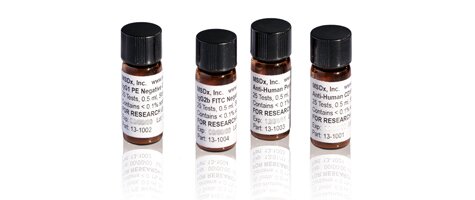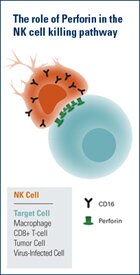The MSDx Technology
MSDx's biomarker development strategy is firmly embedded in an understanding of disease mechanisms, as the best biomarkers arise from molecules and cells that participate in the disease mechanism.
Consequently, MSDx Inc. is developing a set of biomarkers for monitoring key pathophysiological processes in MS. MSDx Complex-1 is a protein complex in plasma that is associated with sub-clinical and clinical inflammatory disease activity. A second marker monitors the killing competence of NK cells which express CD16 and Perforin. NK cells are believed to play an immunoregulatory role by attenuating autoimmunity through cytolytic deletion of antigen presenting cells and effector T-cells. It has been well established that there is an acquired defect in NK cell killing activity in MS.
MSDx has also discovered that debris-laden phagocytes enter the blood circulation and have demonstrated that CNS antigens can be found in peripheral blood mononuclear cells (PBMCs) of MS subjects. As these antigens are degraded in 24-48 hours this phenomenon may be utilized to monitor active demyelination by measuring myelin basic protein and/or proteolipid protein in PBMCs. By the same principle, active neurodegeneration may be monitored by measuring Tau and/or Hippocalcin-1 in PBMCs. MSDx's assays can be used individually, or in combination, to monitor the disease process in MS patients.
- MSDx Complex-1 - Inflammation
- NK Cytolytic Competence (CD16/Perforin) - Immunoregulation
- PBMC - Myelin Basic Protein - Active Demyelination
- PBMC – Tau - Active Neurodegeneration
- PBMC - Hippocalcin1 like-1 - Active Neurodegenerationdd
MSDx is pursuing several clinical and basic research studies in association with academic, commercial and non-profit institutions to develop its biomarkers for research and clinical use. Initially these markers will be available as research use only (RUO) kits, the first of which is now available. A description of MSDx's biomarkers and their potential applications is given below.
MSDx Complex-1
MSDx has characterized a high molecular weight protein complex that has been found to be associated with neuroinflammatory diseases and possibly other inflammatory conditions. Multiple sclerosis (MS) is an inflammatory disease; however, established markers of inflammation such as C-reactive protein aren't elevated in MS except during an acute relapse/exacerbation. Unlike C-reactive protein, MSDx Complex-1 is elevated in MS patients that are not experiencing an acute relapse and may be a means of monitoring sub-clinical disease activity. Ongoing and future research studies will confirm our preliminary research findings and firmly establish the relationship of MSDx Complex-1 with fluctuations in disease activity both spontaneously and in response to disease modifying therapy. This product will initially be released as an RUO ELISA kit.
NK Cell Perforin
Over three decades of literature have documented an acquired defect in NK cell killing activity in multiple sclerosis patients as well as in other autoimmune diseases. A small number of published studies indicate that transient depressions in NK cell killing activity lasting approximately one month are coincident with relapses in multiple sclerosis, and is consistent with the hypothesis that NK cells (innate immunity) can regulate autoimmune processes by cytotoxicity directed at effector cells (lymphocytes, macrophages) and antigen presenting cells (macrophages, B-cells etc). To date, the molecular basis of the NK cell killing activity defect has not been elucidated.
MSDx has discovered that there is a relative deficiency in the percentage of CD16 positive lymphocytes (NK cells) that express Perforin, a protein involved in the cytotoxic killing mechanism of NK cells and cytolytic T-cells. Ongoing and future research studies will confirm our preliminary research findings and firmly establish the relationship of the percentage of CD16 positive lymphocytes (NK cells) that express Perforin with relapse/exacerbation of disease. This product has been released as an RUO immunophenotyping kit, NK Cytolytic Competence (Human CD16/Perforin), for flow cytometric analysis of lymphocyte subsets.
Window into the Brain™
Until now, progress in the development and use of biomarkers for MS has been limited by inherent barriers associated with studying the brain. In inflammatory diseases such as MS, leukocytes migrate into the affected organs. The ingressed cells play many roles in disease and repair of the organs. Some of these cells are phagocytic and ingest damaged tissue to prepare the site for repair. These debris loaded cells are conventionally thought to egress the damaged organ through the lymphatic circulation and not by returning to the blood circulation. MSDx has that discovered that peripheral blood mononuclear cells (PBMCs) of MS patients contain neural antigens and can be used as a novel source of biomarkers that relate to the disease activity of a multiple sclerosis patient.
This new diagnostic approach calls for obtaining a blood sample from the patient to harvest the peripheral blood mononuclear cells (PBMCs). The PBMCs contain phagocytic leukocytes that are involved in the cleanup process at the damaged site. MSDx has produced pilot study data that indicate that phagocytic cells that are recruited into the brain to clear away damaged tissue re-enter the peripheral blood containing cellular cargo from the site. These cells contain important clues about the disease activity taking place in the brain. The MSDx technology measures this biomarker cargo within the peripheral blood PBMCs. MSDx refers to this patent pending approach as "Window into the Brain™." Continuing and future research will validate this marker approach for research and clinical use. This product will initially be released as a series of neural antigen specific RUO ELISA kits.


Watch:
MSDx - A Personalized Medicine Solution for the Brain





